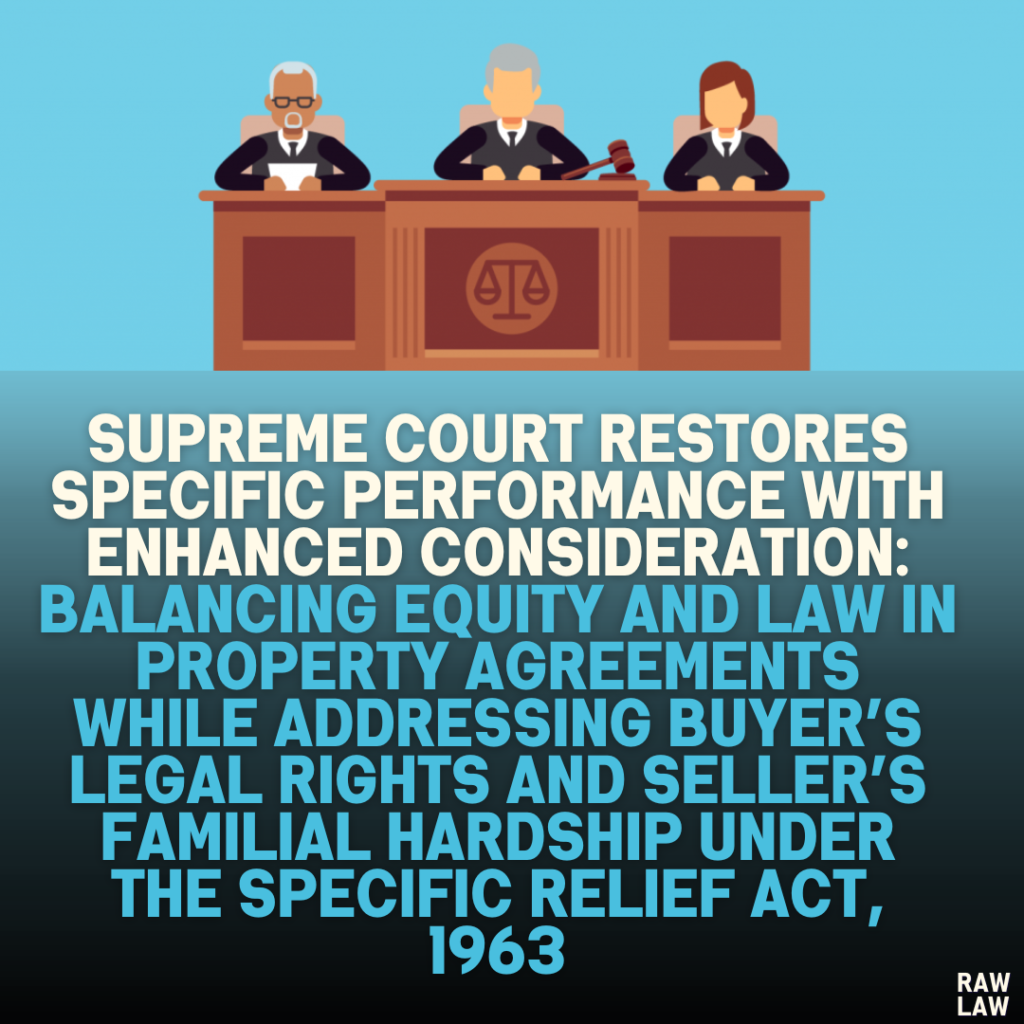Court’s Decision:
The Supreme Court set aside the High Court’s judgment, which denied specific performance of the contract, and restored the Trial Court’s decree with modifications. It directed the appellant (buyer) to pay an enhanced balance consideration of ₹20,00,000 to the respondents (legal heirs of the seller) within a specified period. Upon receiving the payment, the respondents must execute the Sale Deed in favor of the appellant.
This decision balanced the legal obligation of the respondents to honor the agreement with their personal circumstances, such as the widowhood of Respondent No. 1 and the minor status of Respondent No. 2.
Facts of the Case:
- Agreement of Sale:
- The appellant and Late Prabha Ranjan Das (original owner of the property) entered into a registered Agreement of Sale on 27.05.2016.
- The agreed sale price was ₹17,50,000, out of which the appellant paid ₹4,00,000 as earnest money.
- Demise of Seller:
- The seller, Das, passed away on 05.07.2016, leaving the respondents (his widow and minor son) as legal heirs.
- Breach of Contract:
- The respondents refused to execute the Sale Deed despite being bound by the agreement, prompting the appellant to file a suit for specific performance in 2016.
- Trial Court’s Decision:
- The Trial Court decreed in favor of the appellant, ordering the respondents to execute the Sale Deed upon receipt of ₹13,50,000 (balance consideration).
- High Court Reversal:
- The High Court reversed this decision, holding that enforcing the contract would cause hardship to the respondents, rendering them homeless.
Issues Before the Supreme Court:
- Whether specific performance of the Agreement of Sale should be granted to the appellant.
- Whether the respondents’ claims of hardship were valid and unforeseen.
- Whether the appellant fulfilled the requirement of readiness and willingness under the Specific Relief Act, 1963.
Petitioner’s (Appellant’s) Arguments:
- Residency of Respondents:
- The respondents were residing in the parental home of Respondent No. 1 and not on the suit property.
- Hence, their claim of hardship and potential homelessness was factually incorrect.
- Readiness and Willingness:
- The appellant demonstrated consistent readiness and willingness to fulfill his contractual obligations, as evidenced by the payment of earnest money and readiness to pay the balance.
- High Court’s Oversight:
- The High Court ignored the Trial Court’s findings that hardship to the respondents was neither proven nor a valid defense.
Respondent’s Arguments:
- Hardship:
- If the property (their only residential house) were sold, they would be left homeless, causing undue hardship.
- Faulty Trial Court Ruling:
- The Trial Court allegedly failed to frame issues regarding the appellant’s readiness and willingness to perform his contractual obligations.
- Equity and Justice:
- The respondents argued that denying specific performance was necessary to avoid unjust consequences, considering their familial circumstances.
Analysis of the Law:
The judgment is grounded in Section 20 of the Specific Relief Act, 1963 (pre-amendment), which provides that:
- Discretionary Relief:
- Courts are not bound to grant specific performance merely because it is lawful to do so.
- The relief depends on equitable considerations and should be exercised judiciously.
- Grounds for Denial:
- Specific performance can be denied if enforcing the contract:
- Gives the plaintiff an unfair advantage.
- Causes unforeseen hardship to the defendant.
- Is inequitable in nature.
- Specific performance can be denied if enforcing the contract:
- Hardship Test:
- Hardship must be unforeseen and assessed at the time of entering into the contract, not based on subsequent developments unless caused by the plaintiff.
The Supreme Court applied these principles to assess the claims of both parties.
Precedent Analysis:
The Court relied on key judgments to underscore its reasoning:
- K. Narendra v. Riviera Apartments (1999):
- Established that hardship unforeseen at the time of the contract can justify denying specific performance.
- Prakash Chandra v. Narayan (2012):
- Held that hardship must be adjudicated with specific issues and evidence.
- Ferrodous Estates v. P. Gopirathnam (2020):
- Emphasized that the mere claim of hardship is insufficient; it must be backed by factual evidence.
These precedents reinforced that the High Court erred by prioritizing unsubstantiated claims of hardship.
Court’s Reasoning:
- Flaws in High Court Judgment:
- The High Court reversed the Trial Court’s decree without framing specific issues on hardship or readiness and willingness.
- It ignored evidence showing that the respondents did not reside on the suit property and had alternative accommodation.
- Balance of Equities:
- While recognizing the respondents’ financial and familial circumstances, the Court noted that these were insufficient to override the appellant’s legal rights.
- Enhanced Consideration:
- To balance equity, the Court increased the balance consideration from ₹13,50,000 to ₹20,00,000, recognizing the widowhood of Respondent No. 1 and the minor status of Respondent No. 2.
Conclusion:
The Supreme Court allowed the appeal, restored the Trial Court’s decree with modifications, and directed the appellant to pay ₹20,00,000. Upon receipt, the respondents must execute the Sale Deed.
Implications:
- Judicial Discretion:
- The judgment highlights the importance of judicial discretion in granting equitable relief, ensuring fairness to both parties.
- Balance Between Law and Equity:
- By enhancing the consideration amount, the Court demonstrated its commitment to balancing strict legal rights with equitable concerns.
- Guidance on Hardship:
- The case underscores the need for concrete evidence to substantiate claims of hardship under Section 20 of the Specific Relief Act.
